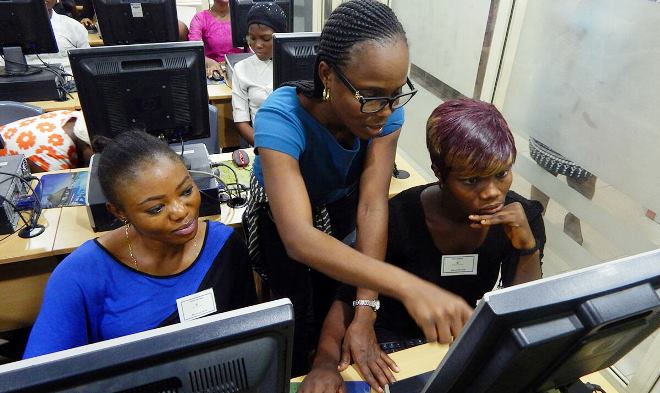The National Bureau of Statistics has reported a troubling gender gap in Nigeria’s technology sector. The report reveals that fewer than 30% of women show interest in tech careers. There is a growing demand for digital skills across various industries. But women’s participation in tech education, training, and career opportunities remains significantly lower than that of men.
RELATED: Valued At Work: A blueprint for inclusion and retention of women in STEM
Barriers to Women’s Involvement in Tech
The low representation of women in Nigeria’s tech industry can be attributed to several factors. Traditional gender norms discourage women from entering male-dominated fields like technology. The consequence is limited support and encouragement. Many women also face challenges accessing quality education in Science, Technology, Engineering, and Mathematics (STEM), undermining their confidence and engagement in tech.
Additionally, a lack of awareness about career opportunities in Information and Communication Technology (ICT) and a scarcity of female role models and mentors contribute to the issue. Economic barriers further hinder women’s enrollment in digital skills programs. Concerns about gender bias and non-inclusive workplace cultures discourage them from pursuing tech careers.
Without strong support networks, many women find it difficult to navigate their career paths in the industry. Addressing these challenges through education, mentorship, and community support is crucial for encouraging greater participation among Nigerian women in tech.
Women’s Role in Nigeria’s Tech Growth: An Uneven Picture
The World Economic Forum’s 2021 Global Gender Gap Report ranks Nigeria 139th out of 153 countries, highlighting the stark underrepresentation of women in ICT. While men actively shape the country’s tech ecosystem, women largely remain passive users, missing out on opportunities for leadership and innovation.
Despite impressive growth in the tech sector, where ICT contributed 18.44% to Nigeria’s GDP in the second quarter of 2022 (up from less than 1% in 2001), women’s participation has not kept pace. Research by ONE Campaign and the Center for Global Development shows that only about 30% of 93 surveyed tech companies in Nigeria are owned by women, and more than one-third of these companies do not employ any women.
Efforts to Close the Gender Gap in Tech
The Nigerian government is taking steps to close the gender gap. Government is raising awareness and supporting initiatives aimed at increasing girl-child participation in STEM and ICT. One such initiative is the Girls in ICT competition, launched by the Federal Ministry of Communications, Innovation & Digital Economy. This competition encourages young girls to showcase their skills, creativity, and innovation in ICT-related fields.
“I am passionate about intentional steps to bridge the gender gap in tech, so I am excited to launch the National Girls in ICT Competition. It provides an opportunity for our girls to actively participate and be inspired to pursue a career in tech,” said Dr. Bosun Tijani, Minister of Communications, Innovation & Digital Economy.
The Challenge of Low Enrollment in STEM
Despite the availability of digital skills programs, women’s enrollment in STEM courses remains low. Although opportunities for women to participate in tech have increased, many still hesitate to engage fully. This underrepresentation limits individual growth and hinders the broader potential for innovation and diversity in the industry.
Addressing this gap is essential to ensuring that women’s voices and talents are reflected in Nigeria’s digital landscape. By investing in women’s education and encouraging more women to enter the tech workforce, Nigeria can make significant progress toward achieving Sustainable Development Goal 5, which aims for gender equality by 2030.
Why Women’s Participation in Tech Matters
Involving more women in ICT can lead to transformative societal changes. Women bring diverse perspectives and fresh viewpoints, fostering innovation and creating solutions that appeal to a broader audience. Gender diversity in tech enhances collaboration and creates a more inclusive work environment, promoting better problem-solving and decision-making.
Women in tech often prioritise projects that address social issues such as health, education, and sustainability, steering technology toward responsible goals. Additionally, gender diversity has been shown to improve financial performance and economic growth, benefiting society as a whole. Women’s participation in tech can also result in more user-friendly and accessible technologies, while their collaborative and empathetic leadership styles contribute to healthier workplace cultures.
Bridging the Talent Gap
Nigeria’s tech sector faces a significant shortage of skilled professionals. Less than 0.05% of the country’s population of over 200 million are software developers. This presents a huge opportunity for women to fill the talent gap. Offering scholarships for women across Nigeria’s six geopolitical zones and leveraging the offices of First Ladies in the 36 states to mobilize awareness can help bring more women into the tech industry.
Closing the gender gap in tech will not only empower women but also drive Nigeria’s economic growth and technological advancement. This paves the way for a more balanced and equitable society.
COVER PHOTO: World Wide Web Foundation
































